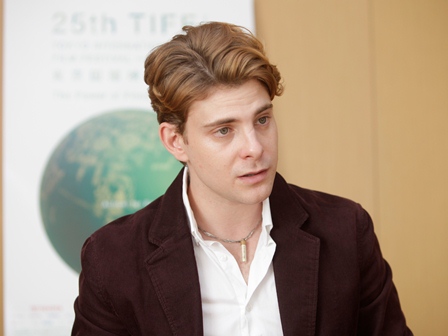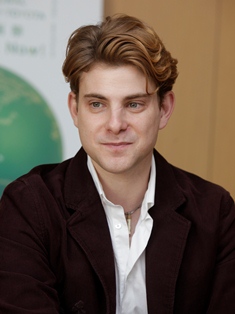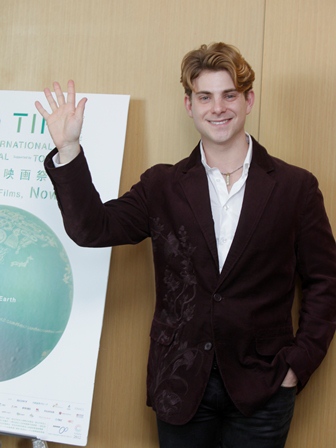Interview with Producer Daniel Marc Dreifuss (“No”)

Daniel Marc Dreifuss, producer of “No” is passionate about the universality of its story – how Chilean dictator, Augusto Pinochet fell from power. The story is brilliantly depicted by director, Pablo Larrain, with star, Gael Garcia Bernal. During Dreifuss’s very short stay in Japan, we chatted about how it all came together and the larger message that “No” has for all struggling for justice and freedom.
– How did you get involved with working with Pablo Larrain?
Daniel Marc Dreifuss: The way I got involved was – I’m L.A.-based, and I met Juan de Leos, who is Pablo’s brother in Los Angeles. I organize a trade mission – an immersion program bringing Ibero-American filmmakers to Los Angeles. So, people from Spain and Latin America, I bring them for a week around AFM. Actually, so, a couple of years ago, this guy named Juan came for a training before he pitched at AFM. He mentioned that he was here with a project called “No.” And then he basically pitched it for two minutes. I probably heard 28 pitches that day – I only remember his. Because the second he spoke about it, it was not that I wanted to make this film, but I needed to tell this story. And the reason the story was so important to me is… it’s a two-pronged thing.
On a personal level, I’m from Brazil. My father was a big political scientist and known author. His theme of work actually was the dictatorship in Brazil. So, I grew up in a very political household in a country that was also a dictatorship around the same time. When I was a child, Brazil was still a dictatorship. So it was my way of being in the United States and through my work, referencing my upbringing. Nearby, Argentine, Brazil, Chile all had dictatorships. It’s a very difficult, but common bond that these countries have. So, it was a way of referencing where I came from. That’s on me… and not as important as the fact that I thought to myself, yes, this will intrinsically always be a Chilean story and crucial to the Chile that we know today. However, if we do this as a co-production and we do this well enough – where it’s a little bigger and a little more universal, a little more accessible… and we do this well enough that it can cross over and reach other countries – countries that usually don’t get foreign films or Spanish language films. We have a real opportunity to inspire people, I hope. And this seems just so immensely timely, ever so timely, with the idea that these people in 1988, under a dictatorship, with so little were able to do so much and change the destiny of a country and a people. What could people today with the Internet, twitter, facebook, all this social media do to connect themselves and fight for their own rights? Fight for whatever their happiness may be.
And the semantic meaning of that happiness will change. In some countries as I mentioned earlier, it could be the right of a woman to drive alone. In another country it could be the right of a woman to go to a hospital or a doctor is she needs to without having to ask permission. If you ask some people living down the street from me in L.A., it could be the right of people marrying somebody of the same sex. In some countries like Chile right now, it’s the right for free education. So, the rights and the need for a voice they remain. What that right may be or what they’re speaking for, or what happiness is to an individual, in different cultures and different parts of the world may change, but the need is the same. And I said, here we are in 2012 still fighting for such basic rights in so many places in the world. I hope that people can look at these people in Chile in 1988 – even if they never heard of Pinochet or of Chile – and say, I see myself, I see my own fight and if they were able to do that with so little, what can I do today for my own happiness? And then, the political unrest in the Middle East happened and is still happening. And it just validated that feeling that, yes, look at everything they’re able to do in Libya and Cairo by using social media and organizing themselves and showing up at the square and all the changes that happened in bringing down a dictator and promoting change and unrest in the last 12 months. But there’s still a lot of work to be done. So, in that sense this film has to be told because I think it could inspire people today.
– The film itself shows a very positive outcome – getting rid of Pinochet, democracy for Chile after years of horrible times – but it also takes a critical stand about methodology of how it was done, commercial, popular advertising. Not the traditional ways of talking about the horror, bringing up the victims of torture. Our hero, Rene Saavedre says, no no no, keep thing positive, and plus he takes this idea of how to turn no into a positive thing. In the end when they win the plebiscite and there’s that wonder scene where he’s with his son walking through the crowds, he has this look on his face, which is partially shock, but also with this questioning look. That he won by using the method of the enemy, as it may be.
Dreifuss: I think that Pablo [Larrain] who is Chilean and comes from a political family mentions something interesting often. And he’s said it many times. The dictatorship left. But the way the transition took place is what consolidated capitalism and international money as the only viable way that the country could be put back together. And the fact is that the transition came through such commercial ways – the stone of using democracy as a product, which is a line in the movie when his counterpart in the no campaign say he’s not comfortable talking about democracy as a product. But it is, in that sense. It kind of sealed what Chile would be from then on. That international interests, international money and capitalism were going to be the way that the country was going to reorganize itself. By no means can you call it the dictatorship of capital because you cannot possibly compare it to the oppression of people being shot on the streets. But it is a fact, that after that time, a new system implemented itself, in part because of the way the transition took place. And I think that that’s described in the movie where he’s presenting the campaign and one of the people in the room gets up and says, “This is what you are. This is what you guys truly are. And I’m not going to stand here for this.” He said he didn’t only want to win, but he wanted to win and change Chile in a profound systematic way and other people only wanted to win. I believe that winning, obviously brought freedom and saved that country. It was the last one of the dictatorships in South America to fall. It was 15 years too late. What you say is absolutely accurate and I think it’s very perceptive. Even at the end, the rivals come together over an ad, a campaign and another product. Life continues for those characters through that angle. It is the reality that we all face. It’s not just Chile. It’s many places in the world.

– Had you known of Pablo Larrain’s work before you got this pitch?
Dreifuss: Yes, but I had only seen one of his two films. The other one I saw after I heard of the story and as I was already working on the project ["No"] actually. I worked on the project actually before I met him because I was in L.A. and he was in Chile. But yes, then I saw the second film ["Post Mortem"].
– Apparently there’s really another “first film” that I’d never seen.
Dreifuss: Yes, “Fuga.” But it’s not a movie that he often talks about. It’s definitely not part of an intentional trilogy. It’s his first film. I don’t think it rises up to the very high standards that he sets for himself. He’s a wonderful, wonderful person, in addition to being immensely talented. In fact, I have to say this. That the biggest joy that I had in this movie is the way people respond. In a visceral manner. Like this morning, there was a line of people wanting to thank me for the film. One girl came crying. And I thought, if we can inspire or touch people in that manner, I think that we did our jobs. That’s why we make movies – to entertain and hopefully inspire as well, because this movie does serve a certain social function. There’s a social action that can be attached to it. Right? And in that sense, Participant Media, the studio that financed the film is a studio whose every film it makes has a social action attached to it. Go to the website and check it out. I feel that this movie was made by a group of people, that when the movie ended, we were much closer that we were when the movie started – which in the movie world is rare. It’s a movie that I’m very proud of for the human element that was involved. Gael [Garcia Bernal] is immensely talented. Everybody knows it. But what I got to know is what a fantastic human being he is and how politically engaged he is. As well as Pablo. What a lovely human being he is. The whole troupe of actors. It’s one of those rare instances where people really came together and the human value is as great as the artistic merit of the film. Because you never know what goes on behind the scenes. You have great movies that were a tragedy on the set. This is a move where everyone was so close. It’s group of very special people that came together and I’m very, very happy that I was able to be a part of that.
– How did you get Gael Garcia Bernal on to this project?
Dreifuss: He was on the project before me. When I heard there was a very, very, very early draft of the script – that doesn’t resemble the movie at all – before it was an international production, Gael was already there. And my understanding is Pablo took the project to Gael. Gael is politically engaged, so he wanted to be a part of it. And then he saw Pablo’s work and became a fan and said I want to do it. But it takes that special guy. Not special actor. That he is. But a special person to say I want to tell that story.
– Here you have this great movie that’s winning awards at Cannes and getting great press. It’s a very particular story to Chile that has larger resonances, as you say. Do you think it’s going to be difficult getting this film into the international and North American market and receive successfully? It may be such a specific piece of history… many people in the USA might say, oh yeah, Chile, so what?
Dreifuss: Every time you say “foreign language” in the US market you have to consider the reaction. This is a broad question. Let me try to rein it in. We did not make a movie for the masses. This story is a political film. It’s a period film. It’s a Spanish language film. We would have done it with modern equipment to look pretty. It’s not what we were going for. Is it going to play in the mall in Kansas or Arkansas? No. I went to high school in Columbia, Missouri. Is it going to play in the art house theater in Colombia, Missouri? I hope so. Sony Classics bought the film for US distribution in Cannes. So we are going to theaters in the United States. But the, we aren’t “The Avengers.” We’re not “Transformers.” But then again, we were never meant to be. I hope that we truly speak to the movie’s audience. And in being as authentic and realistic as we can, using cameras from the 80s and the visuals and the original footage, I hope that we appeal to the audience and transcend that audience. But transcending that audience will never be mass market. It’s not what this is. It’s not going to be a mass market movie. However I do hope that the film is not perceived as “Chile.” It should be perceived as an inspirational story of how individuals were able to take control of their future and change a whole country. And that appeals universally. And the need for a voice is universal. So I hope that we fall in the universal themes and that people are drawn for the inspirational element of and not “Why Chile? It’s such a distant past,” because it may resonate with you today. To speak for something or to care for somebody else’s issue and then take part in it even if it’s not your issue. I think that equality and new rights are only achieved, when people who are sometimes outside of the very core group that needs those rights, speak and walk down the streets with those people. So, I hope it inspires people in that way. I am confident that the film will cross over. I think it will be bigger than the obvious, small foreign language film. I think that the indications that we have from the markets early on, the way the film has sold, is indication that people have expectations -but within the realm of foreign films.
– Has this film played in Chile?
Dreifuss: Yes it has. It opened in August.
– And what have been the responses there?
Dreifuss: I’m sure that some people felt it was a polemical film. But I think the response has been great. They had – I wasn’t there for the opening – I believe, there were three former presidents in attendance. You know about the student protests?
– Yes.
Dreifuss: So obviously, the country’s very engaged. This generation right now is going without compromises and asking for a lot. Not just no Pinochet. The people now want everything. They want free education. They are not compromising unless they get education. They are not going back. I think it is a country that is prime for this kind of material. Did it do well? Better than expected? Yes. It also opened against a record-breaking very popular mass-market Chilean movie that made a whole lot more money. Better that expected for a period, political, fascinating film.
– And it does have Bernal in it!
Dreifuss: I forgot to say this. The fact that we have Gael is not even the secret, he’s the declared weapon. He will take this movie to places – no matter how good the movie is without him – it would never go. He, absolutely, opens many doors that would never be opened otherwise.

Interview by Nicholas Vroman



















